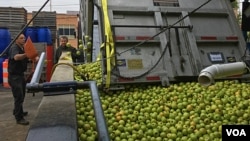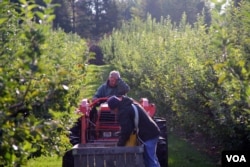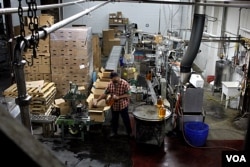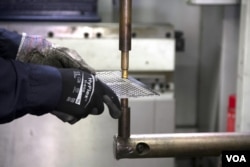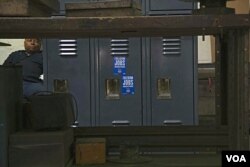When the apple press grinds thousands of kilos of red, green and yellow fruit inside McCutcheon's cider factory, a fine, brown mist hangs in the air. It's been that way for five generations — 78 years — with such daily consistency that family members say they can hardly smell the sweetness of crushed apples anymore.
These small-business owners in Frederick, Maryland, about an hour drive from the stage where the next U.S. president will be sworn in, have kept the company alive through the tenures of 13 presidents, stretching back to Franklin D. Roosevelt’s second term.
CEO Bob McCutcheon, great-grandson of the company's founder, knows the cider will keep flowing from his presses, no matter who is elected Tuesday, because he's followed the family business plan: Buy and sell locally as much as possible. He likes his business small and family owned; about half of his 30-some employees are relatives. Depending on the crop, they try to get as many apples as possible from orchards within a few hundred miles.
McCutcheon likes his government small, too — as local as it can get.
"We're kind of independent of what the economy does, and what the politics does," he said.
Mike McCutcheon, Bob's cousin, who oversees cider production in the factory, says yes, cheaper juice products from places like China have found their way onto shelves in the U.S. and, sure, it might affect the company's bottom line along the way. But the McCutcheons aren't changing their business model just to play catch-up.
Bob says they've rejected offers from corporations to produce for large grocery store chains. He's reluctant to lose the diversity of clients and to depend so much on one or two big contracts. The factory can't afford to cater to its current customers — smaller markets and grocers — and also fill orders for a major grocer.
A new president could mean a trade deal like the Trans-Pacific Partnership, although both Democrat Hillary Clinton and her Republican rival Donald Trump oppose it. But the expansion to overseas markets that TPP would offer just isn't on the McCutcheons' radar.
"There's enough business in this country to keep us going for a good long time," Bob said.
Looking for a trade deal
About 80 kilometers away, on the outskirts of Baltimore, Maryland, self-described entrepreneur Drew Greenblatt craves bigger business. He has taken over extra space next to his metal manufacturing business, Marlin Steel, and busted through the walls with an eye on slow expansion. He won't say who he is voting for, but he wants big trade changes that only the federal government can make.
A trade deal like the TPP could boost Marlin Steel to the next production level. And on Tuesday, he wants a candidate who will give the U.S. a new chance at that to win, so he can export more manufactured steel products overseas, double his staff, and protect the intellectual property rights of his engineers — a major weakness of the current system, according to Greenblatt.
"We need great policy so we can grow," he said from the factory floor, with an enthusiasm for international trade deals that counters the "buy local, sell local" mentality of the McCutcheons.
He's proud to employ 24 people who already make steel products, like cleaning racks for pharmaceutical companies, for customers in the U.S. and dozens of countries overseas. But he estimates that for every $200,000 in additional, consistent revenue he can secure, he can add one additional worker. He sees the international market as ripe for that kind of growth.
"The current politicians are not speaking about growing markets for factories in America so we can sell more," he said. "We need a spark to get growth going again to lift our country up. Right now, we're not getting it from the two candidates."
'Life will go on'
Hector Carmona is slouched in a chair next to workers' lockers on the far side of the factory floor at Marlin Steel, slicing off pieces of a pear to finish his lunch hour. At 58, he's a few years away from retirement, he thinks, after 25 years with the same company — he moved from the company's previous Brooklyn location to Baltimore to keep his job.
He says he's voted Democrat since he got citizenship. He's not worried about the elections, or about the outcome. He's unconcerned about bigoted rhetoric that surfaced in the campaign, sometimes against Latinos like him. He just wants to ride out the next few years before moving from the home he owns in Baltimore, to the home he's built in the Dominican Republic where he returns every year for vacation.
Having moved to the U.S. when he was 20, he plans to ride out his last working days here. Whoever wins, wins, he says, and life will go on.
"That's the system ..." he said, "it's been that way for hundreds of years."




